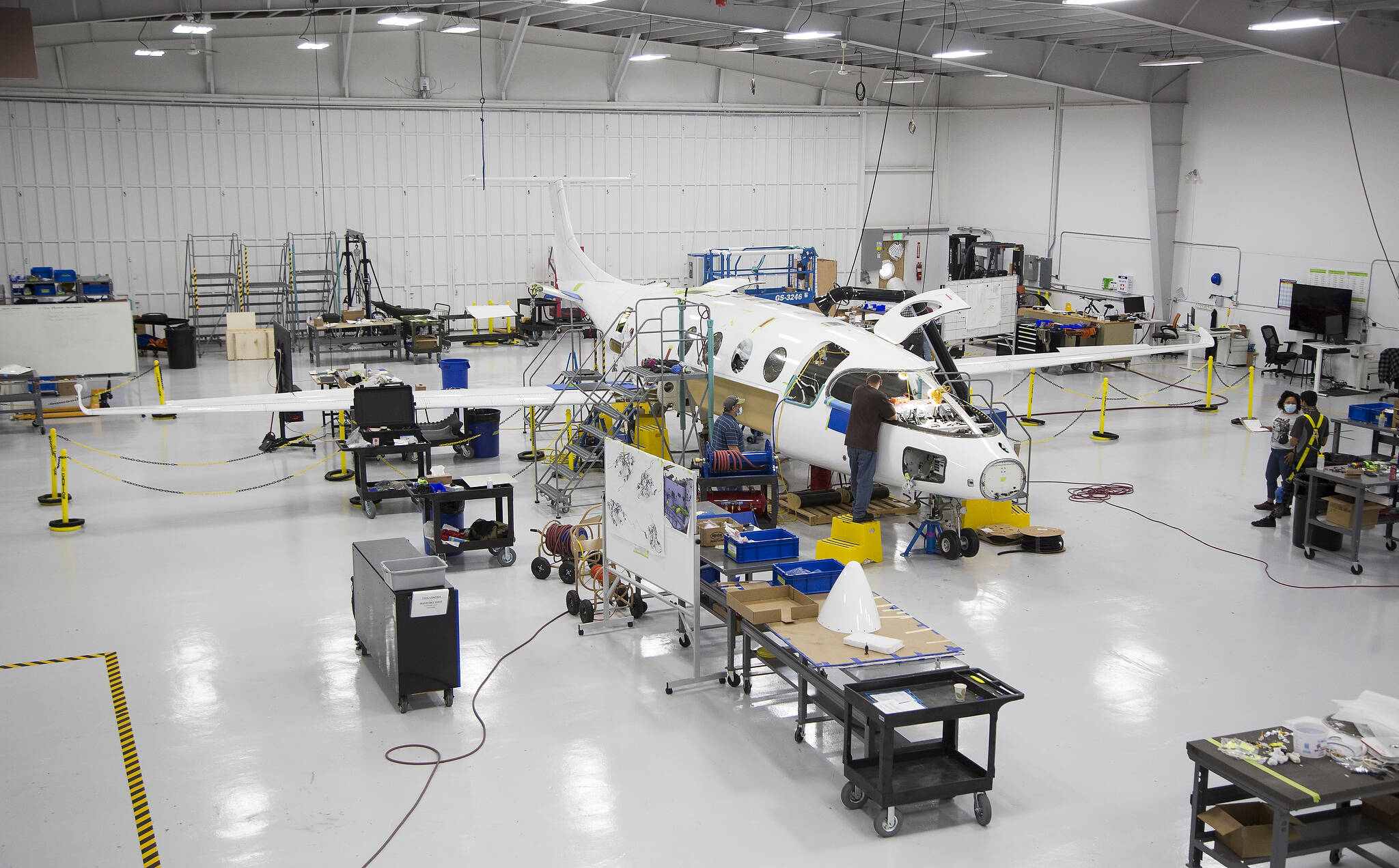ARLINGTON — Was it the rain, or our endless cloudy days?
Arlington’s Eviation Aircraft has moved its fully electric passenger airplane to arid eastern Washington, where it will undergo flight tests.
It was an overland journey for the prototype to a hangar near Grant County International Airport in Moses Lake, Eviation’s CEO, Gregory Davis told The Daily Herald.
Eviation, which has engineering facilities near Arlington, designed and built the battery-powered, all-electric airplane known as Alice.
Alice was slated to make its inaugural flight from the Arlington Municipal Airport this year.
Now the nine-seat plane, which completed ground tests at the Arlington airport this spring, is expected to take its first flight from the Grant County airport.
“We’ve been looking at Moses Lake since I joined the company,” said Davis, who replaced Omer Bar-Yohay when he stepped down as CEO in February.
While wet weather was a factor in the decision to move the testing, safety was the overriding consideration, Davis said.
“Safety is the main thing in anything we do,” Davis said.
Moses Lake is a center for flight testing. Boeing, Mitsubishi and other aerospace companies have conducted test flights at the Grant County airport, Davis noted.
“It’s a massive airport. They’ve got a 13,000-foot runway, which is ideal,” Davis said. “The airspace is dedicated for testing and there’s no commercial travel traffic there. You just have substantially more options with how you conduct your flight with more available runway, and similar with the airspace. We won’t be constrained. We can do whatever we say we’re going to do.”
“I think Boeing has tested almost every one of their aircraft there at some point,” Davis noted.
The company hopes to test-fly the plane, which produces no carbon emissions, this year. “We’re on target for this summer,” Davis said.
The runway at Arlington’s airport is 5,400 feet by 100 feet. The runway at Grant County is more than twice the length — 13,000 feet long and 200 feet wide, Davis noted.
David Ryan, Arlington’s airport director, called Eviation’s decision to move the plane and test flight to Moses Lake “a smart move.” In addition to the bigger runway, the terrain is flat, he said.
“Safetywise, it is a smart move. For the initial test flight, that is the safest option,” said Ryan, who recently met with Eviation to discuss the move.
“Many aviation companies use Moses Lake for testing,” Ryan said. Grant County and eastern Washington generally are much less populous than Snohomish County and the Puget Sound region.
When the prototype completes its maiden voyage, Eviation expects to bring the plane back to Arlington to conduct additional tests, Davis said.
“There’s a big difference between a first flight and a second flight,” Davis said. “We’ll understand the characteristics of the aircraft and make a determination, but I can say for certain that we’re expanding our Arlington footprint and continue to do so.”
The company employs about 140 people at the Arlington location. It unveiled its design for the production version of Alice last year.
It is designed to fly 500 miles on a single charge and has a top cruising speed of 287 mph. Constructed mostly from composite materials, the commuter plane will operate in all environments currently served by piston and turbine aircraft, according to Eviation.
The plane weighs 16,500 pounds, nearly half of which is accounted for by two battery packs. The system is made from currently available battery cells and does not rely on future technology, the company has said. Its fly-by-wire system is made by Honeywell.
Alice is powered by two electric motors designed and built by a sister company, magniX, which is based in Everett.
The two aerospace firms, both working to develop fully electric aircraft, moved to Snohomish County last year and have teamed up to design the new plane.
Both companies are subsidiaries of the Clermont Group, a private investment firm based in Singapore.
Two airlines are waiting in the wings for Eviation’s plane to make its commercial debut.
Last year, DHL, the global package delivery firm, ordered 12 of the planes, which will be configured to carry cargo and have a payload capacity of 2,600 pounds.
Janice Podsada: 425-339-3097; jpodsada@heraldnet.com;
Talk to us
> Give us your news tips.
> Send us a letter to the editor.
> More Herald contact information.

























